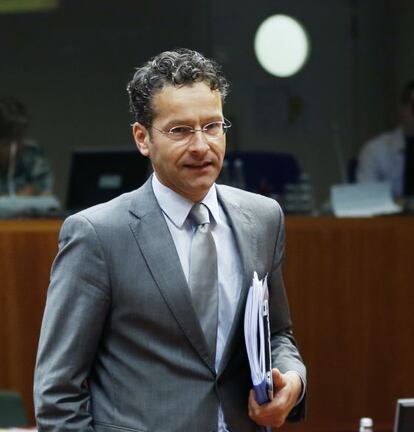“We will have to see if the Spanish banks require more capital”
Eurogroup president Jeroen Dijsselbloem discusses the restructuring of Spain's financial sector

The current president of the Eurogroup, Dutch Finance Minister Jeroen Dijsselbloem, does not rule out an extension of the maturity of the bailout Spain has received from its European partners, even though the government of Prime Minister Mariano Rajoy "has not requested it" and the loan could expire when due in January of next year.
In an interview with EL PAÍS and four other European dailies Dijsselbloem does not rule anything out in the unraveling of the euro-zone crisis but has it clear that, because of the size of its economy compared with those of Greece, Portugal, Ireland and Cyprus, Spain is key.
He acknowledges that the restructuring program for the Spanish financial sector accompanying the bailout is going well despite the fact that the ongoing recession and loan defaults could generate more losses for the banks. "We will have to see if the Spanish banks require more capital."
The Spanish government has spoken of the potential need for an additional two billion euros in capital for the country's banks, although the market is talking about a figure of up to 30 billion euros, of which 10 billion would have to come from the state.
Some sort of preventative credit line could be given to Portugal"
The Rajoy administration believes this sum can be covered by the Orderly Bank Restructuring Fund and the Treasury, although a number of European institutions believe that extending the maturity of the loan of up to 100 billion euros is advisable to provide a safety net, even though this would come at a political cost.
The European Central Bank is due to carry out stress tests of European financial institutions in the middle of next year and direct recapitalization of lenders is only expected to be in place by the end of 2014. "We don't know what the capital needs of the banks are; neither central bankers nor ministers have given us a very clear idea of the situation," Dijsselbloem says. "The only thing we know is that the previous stress tests did not work and the ECB is very aware that if it does not do it well the examination will lose creditability."
Even if Spanish banks emerge more favorably from those stress tests, a number of European institutions still insist on the need to extend the loan from the European Stability Mechanism, from which Spain has only drawn down 41.5 billion euros.
During the interview, Dijsselbloem indicates that Europe will do what is necessary to ensure the rescue programs for Ireland and Portugal are successful, but does not indicate what the final scenario might be. "It is premature to say if Lisbon, for example, can exit the program. A precautionary line of credit from the rescue mechanism is one option but it is too early to say. Some type of preventive program is possible if necessary."
Dijsselbloem is equally cautious about whether Greece will need to restructure its debt. "We will see how Greece is in the spring; if the figures are in line with what is expected," he says. "I don't want to speculate: I can understand that a haircut for Greece could be attractive, but at the same time does not appear the best way to recover financial independence."
Tu suscripción se está usando en otro dispositivo
¿Quieres añadir otro usuario a tu suscripción?
Si continúas leyendo en este dispositivo, no se podrá leer en el otro.
FlechaTu suscripción se está usando en otro dispositivo y solo puedes acceder a EL PAÍS desde un dispositivo a la vez.
Si quieres compartir tu cuenta, cambia tu suscripción a la modalidad Premium, así podrás añadir otro usuario. Cada uno accederá con su propia cuenta de email, lo que os permitirá personalizar vuestra experiencia en EL PAÍS.
¿Tienes una suscripción de empresa? Accede aquí para contratar más cuentas.
En el caso de no saber quién está usando tu cuenta, te recomendamos cambiar tu contraseña aquí.
Si decides continuar compartiendo tu cuenta, este mensaje se mostrará en tu dispositivo y en el de la otra persona que está usando tu cuenta de forma indefinida, afectando a tu experiencia de lectura. Puedes consultar aquí los términos y condiciones de la suscripción digital.








































